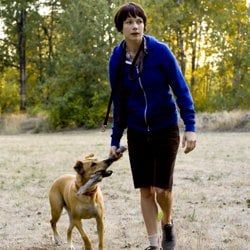NYFF Review: Wendy And Lucy

The New York Film Festival opened this Friday with the Palme d'Or winner The Class, and while I didn't manage to catch that one-- other duties called-- I will be popping in from time to time with reviews of some of the festival's biggest films, along with the occasional interview. The New York Film Festival isn't the kind of festival where you and a bunch of journalists are running all over town and trying to manage your schedules, never managing to catch half of what's playing. There are two press screenings a day, maybe three, and all of them mostly in the same location. For those of us who live in New York and need to carry on our lives as normal, it's a godsend. Of course, this doesn't guarantee I'll see everything, but you won't be getting constant dispatches about how sleep-deprived I am. We'll save those for Sundance.
First up is Wendy and Lucy which premiered at the festival yesterday and is getting a limited release from Oscilloscope Pictures this December.
Buried deep in our American DNA, along with our affection for baseball and big brass bands, there is a love of the road trip. From the Conestoga wagons of the Oregon Trail to Jack Kerouac's Hudson and every endless drive you took in your parents minivan, there's a persistent fantasy of the new life or adventure that lies around the bend, and the character-building and soul-searching that can happen in those hundreds of miles on the pavement.
With Wendy and Lucy, doggedly incisive filmmaker Kelly Reichardt catches one intrepid traveler as the road trip dream starts to unravel. Wendy (Michelle Williams, open-faced and heartbreaking) is en route to Alaska to try and get some menial work, fleeing a mysterious and clearly troublesome family history back in Indiana. In a railroad town somewhere in Oregon, Wendy's Honda breaks down, and she and her beloved dog Lucy are stuck waiting to find out how to repair it despite Wendy's dwindling cash supply.
As far as plot goes, that's pretty much it. We see Wendy's troubles, both financial and the deeper, existential ones, mirrored in her encounters with various people, from a security guard who does his best to help her to a group of punk kids camping out by the railroad. By being female, alone, and fiercely devoted to her dog, Wendy can't catch a break; even when she calls her sister back in Indiana, it's clear that Wendy's plight doesn't matter much to the world at large. A girl who brushes her teeth in rest stop bathrooms and isn't above sleeping in the woods, all for the sake of some unexplainable desire for freedom, won't fit into the regular world no matter how hard she tries.
Reichardt leaves ample room for the audience to draw their own conclusions about Wendy and the people she encounters, depicting a nameless town in which most everyone tries to do good, even when they don't know how to help. And Williams never begs sympathy or scorn in her performance as a woman who has chosen to take dramatic action in her own life, but stuck in this town can now only react to the whims of others. This small Oregon town seems to represent a crossroads for Wendy, where she can choose to pursue her road dream at great cost or slink back to the safety and, surely, suffocation of Indiana. Williams, playing huge ranges of emotion with only her eyes, makes both of those possibilities seem completely possible.
The fact that Wendy is a woman affects very little of the plot but completely changes the movie's significances, adding an important new chapter to the endless roster of male-centric road stories about self-discovery. Though she is white and apparently smart, Wendy never seems spoiled or pretentious, emulating Kerouac with no concept of reality. Part of that is due to Reichardt's exquisite care for her character, but it's also because Wendy is breaking the mold; women can and do go on self-absorbed road trips, but it's rare that we see them onscreen.
CINEMABLEND NEWSLETTER
Your Daily Blend of Entertainment News
Coming in at barely 80 minutes, Wendy and Lucy earns its slow pace, letting the audience settle into the narrative rather than struggle to keep up. It's a spectacular coincidence that the movie comes at a time of such massive economic uncertainty, when Wendy's solution to whatever troubled her back in Indiana might seem even more appealing to the rest of us. Somewhere between a cautionary tale and a simple character study, Reichardt's film belongs to that part of all of us that finds hope on the other side of the horizon.
Staff Writer at CinemaBlend
Most Popular








